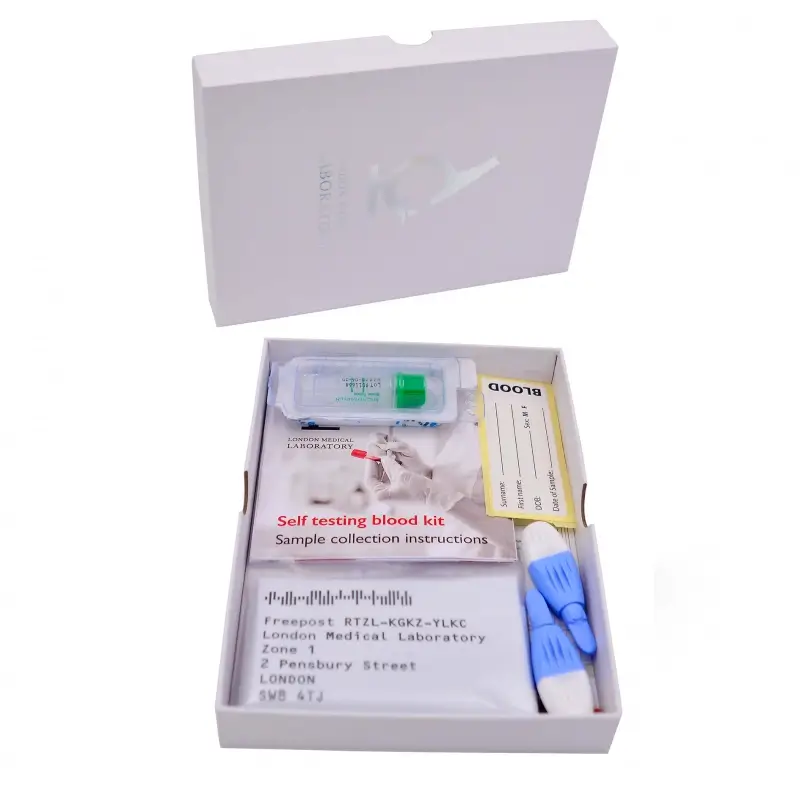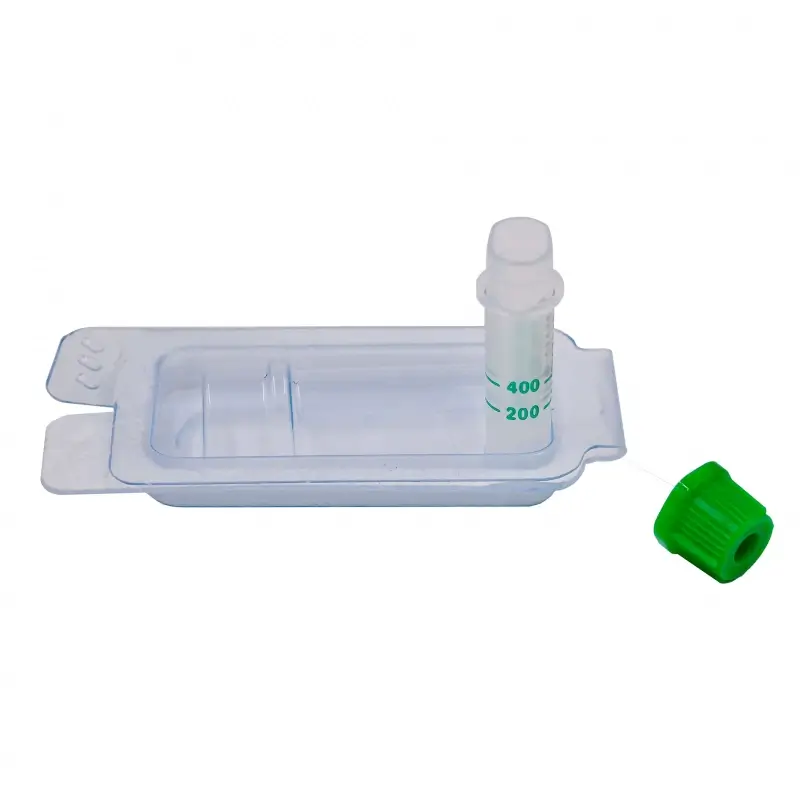
General Health Profile
Understand Your General Health
We are working in partnership with London Medical Laboratory to provide you with a General Health Profile test that is designed to offer a comprehensive overview of your baseline health.
The price of our General Health Profile is provided during booking, prior to confirming your appointment.
Introduction to the General Health Profile Test
Our General Health Profile is designed to provide a comprehensive overview of your kidney and liver function, your iron levels, bone health, diabetes risk, and a full cholesterol profile. As part of the test, more than 25 individual biomarkers are looked at in order to deliver a detailed look at your baseline health.
How Does the General Health Profile Test Work?
A blood test is a straightforward way to identify and/or monitor underlying health concerns and conditions.
Whether you are curious about your overall health, you are working hard to monitor a condition you have already been diagnosed with, or you have some specific concerns regarding your health, a blood test is an affordable, efficient and simple way to gain an understanding of what is going on inside your body.
Here at Amiry and Gilbride Pharmacy, we provide in-store testing, as this is the best way to ensure that the process is as stress-free, convenient and simple as possible.
You can expect to receive your results within 5 to 7 days following your appointment.
Before booking your General Health Profile test, please be aware that no blood test should be viewed as an alternative to booking an appointment with your doctor, especially if you are experiencing symptoms that are causing you concern or worry. After receiving your test results, do not self-diagnose a condition or begin a course of treatment without first consulting with a trained medical professional.


What Does the General Health Profile Test?
If you are curious about our General Health Profile, let’s take this opportunity to look at the biomarkers that will be tested and analysed.
CHOLESTEROL (6 BIOMARKERS)
High levels of cholesterol can result in blocked arteries, which can cause stroke, heart attack or the development of coronary heart disease. Understanding your cholesterol levels can help you to make good dietary and lifestyle choices in order to improve your quality of life and minimise your chances of developing a serious health issue.
– Total Cholesterol
Your total cholesterol level measures all the cholesterol present within your blood, including both high density lipoprotein and low density lipoprotein cholesterols. Our bodies use cholesterol to produce certain hormones, but there are both ‘good’ and ‘bad’ cholesterols that are important to keep track of.
– High Density Lipoprotein (HDL)
‘Good’ cholesterol is known as HDL, and its primary purpose is to keep the arteries in the heart clear by removing ‘bad’ cholesterol.
– Low Density Lipoprotein (LDL)
LDL is the ‘bad’ form of cholesterol, which can cause build-ups and blockages in our heart’s arteries. Both HDL and LDL tests are used to help determine your chances of developing heart disease.
– Total Cholesterol: HDL Ratio
Your HDL ratio essentially calculates how much of your total cholesterol is formed of ‘good’ HDL cholesterol. This can be an important piece of information when determining heart health and understanding your risk factors for developing heart disease.
– Non-HDL Cholesterol
This biomarker specifically looks at your lipid profile and determines how much ‘bad’ cholesterol is in your blood. Again, this can be an important piece of the puzzle when identifying potential risk factors for heart disease.
– Triglyceride
Triglyceride is a fat that the body stores in its tissues and is often derived from foods like butter and oils. This is another test that looks at your lipid profile in order to estimate how likely it is that you may develop heart disease.
DIABETES (1 BIOMARKER)
Undiagnosed and untreated diabetes is a leading cause of mortality, but it can be easily detected with a simple blood test.
– Haemoglobin A1c (HbA1c)
Glucose can build up in the bloodstream where it binds to the haemoglobins that are present within red blood cells. Red blood cells have an average lifespan of 120 days, after which they are replaced by new red blood cells. The HbA1c test measures your average blood sugar levels over the previous 8 to 12 weeks and can be used to diagnose diabetes.
GOUT (1 BIOMARKER)
Gout is an extremely common type of arthritis, which can impact anyone who has high levels of uric acid. Although gout can be quite complex, it is manageable and many people are able to prevent recurrence.
– Urate
Urate or uric acid is produced when purines from digestion or DNA break down. Uric acid is filtered out from the body by the kidneys, before it is excreted via stools or urine. Urate tests can be used to diagnose gout and identify the cause if you are experiencing recurring kidney stones.
IRON STUDIES (5 BIOMARKERS)
A number of biomarkers make up a complete iron study, which is used to determine how much iron is being carried around your body and how much is being stored in tissues. Iron deficiency is a relatively common health issue and can cause a range of symptoms including shortness of breath and chest pain, weakness and fatigue, heart palpitations, and dizziness.
– Iron
The body needs iron to create new red blood cells, which are responsible for transporting oxygen around the body and maintaining healthy organ and muscle function. This biomarker looks at your total iron levels to provide a general overview. High levels of iron in the blood can suggest liver disease, whereas low levels may indicate that you are anaemic.
– Total Iron Binding Concentration (TIBC)
This test looks at the maximum level of iron that your blood can transport, which can offer a bit more context to your overall iron count and indicate whether you are experiencing any absorption issues. TIBC tests can also help to diagnose conditions caused by high or low levels of iron, such as haemochromatosis and anaemia.
– Unsaturated Iron Binding Concentration (UIBC)
UIBC tests look at the level of transferrin that is working to transport oxygen around your body. This test is commonly used to keep an eye on treatment outcomes for conditions like iron toxicity, but it can also help to shed additional light on your overall iron profile.
– Transferrin
This is an iron-binding glycoprotein produced in the liver, which can help to understand your body’s overall iron status and provide additional context that may inform an iron-related health condition like anaemia.
– Creatine Kinase
Found in the heart and skeletal muscles, creatine kinase is an enzyme that can help to diagnose and/or monitor injuries to the muscles as well as diseases which affect the muscles, such as muscular dystrophy.
KIDNEY FUNCTION (5 BIOMARKERS)
The kidneys have an important role to play in the removal of waste products from the body. Additionally, they also support the releasing of blood pressure regulating hormones, and the formation of new, healthy red blood cells.
– Urea
This waste product is formed from amino acids in proteins and is released into the bloodstream. The kidneys are responsible for filtering urea out of our blood to be excreted from the body via urine. Urea tests can provide an overview of how well your kidneys are working, which may help to identify certain diseases that affect the liver and kidneys.
– Creatinine
When the muscles in our body contract, they create a waste product called creatinine. Again, the role of the kidneys is to filter creatinine and ensure it is excreted by the bladder in the form of urine. As such, this biomarker can also provide a good understanding of how well your kidneys are functioning.
– Glomerular Filtration Rate (GFR)
This biomarker measures the glomeruli, which are the kidney’s filters, playing an essential role in the removal of waste from the blood. The GFR test can be used to identify and monitor any alterations to the status and functionality of the kidneys.
– Calcium
This important mineral can be found in our bones and in our blood, where it plays a vital role in blood clotting. Calcium in the blood can be free or bound to proteins, such as albumin. This general calcium test can be used to identify health conditions linked to the kidneys, heart and bones.
– Adjusted Calcium
This test specifically looks at how much albumin protein is present in your blood in order to understand how much free calcium is present within your body. This can provide a bit more context to a general calcium test and can help diagnose health conditions that may affect the heart, kidneys and bones.
LIVER FUNCTION (8 BIOMARKERS)
The liver supports a number of essential bodily processes, including detoxifying the blood, fighting infection, and regulating blood sugars.
– Albumin
Produced by the liver, albumin is a protein that works to keep fluids within the bloodstream and support the transportation of vitamins and hormones throughout the body. Understanding albumin levels can help to diagnose a range of health issues, including those affecting the kidneys and liver.
– Globulin
Globulin is another protein produced in the liver, but this protein plays an essential role in fighting infection and supporting normal blood clotting. As well as helping to identify disease or damage to the liver, this test can also support the diagnosis of kidney disease and certain autoimmune conditions.
– Total Protein
This test measures the total amount of globulin and albumin in the blood, which can provide important contextual information to support the diagnosis of health issues impacting the liver, kidneys or immune system.
– Alkaline Phosphatase (ALP)
This is an enzyme that can be found in the bones and liver, which can provide information relating to your general bone and liver health.
– Alanine Transaminase (ALT)
The ALT enzyme is released into the blood following an injury to the skeletal muscles, liver or heart.
– Aspartate Aminotransferase (AST)
This enzyme is produced in the liver and is also released following injury to the liver, heart or skeletal muscles. Both AST and ALT can be used to detect liver disease.
– Gamma Glutamyl Transferase (GGT)
Found in the liver, kidneys, spleen, gallbladder and pancreas, GGT is an enzyme used when the body metabolises toxins. This test can help to diagnose injury to the bile ducts or liver disease.
– Total Bilirubin
Bilirubin is used to support the digestion process and can be found in bile. Additionally, bilirubin is also produced when red blood cells reach the end of their lifecycle and break down. This test can be used to identify and monitor types of anaemia and diseases affecting the liver.
FAQs
1. Is the General Health Profile a fasting blood test?
No, there is no need to fast before attending your appointment for any of the blood tests we offer.
2. Why is a General Health Profile beneficial?
Our General Health Profile test checks the functionality and overall health of a number of vital organs in the body, including your kidneys and liver. It also looks at your mineral, cholesterol, and iron health, which support many functions and processes in the body.
3. Is this test different from your Premier Health Profile?
In addition to the biomarkers tested here in our General Health Profile, our Premier Health Profile test also includes a complete blood count (CBC), which may help to identify a number of common illnesses.



